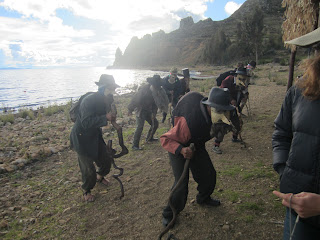I’m going to try to sum up Monday through Friday in one post, since I’m obviously struggling to keep up the 1-post-per-day thing. So Monday, I had no school in the morning, so I worked on the large amount of homework I had due Tuesday. I also didn’t have school Wednesday morning, as a last minute change. That ended up working out perfectly, since I had to schedule a last-minute Skype interview Wednesday morning for a summer job.
This week in Spanish class, I saw a video about cargadores, or carriers. Cargadores are men who you hire in the market to carry goods. The video was particularly about potato carriers. They carry 45 pound sacks of potatoes. Cargadores always work in groups, and have regular customers they carry for. Most of them are from the country, and moved to the city to help their families. But the cargador culture is that they go out to a bar and drink alcohol with their coworkers. When the men were interviewed about this culture, they (individually) said that they were torn between their family and their new friends. They could not survive without their “brothers” or the men that they worked with, so they felt they couldn’t refuse to drink with them/ buy them drinks. The cargadores sleep on the street, or if a bar-owner takes pity on them, in the bar. Part of cargador culture is not going to the doctor for sickness or injury. The video was really sad and showed how important culture and community is—aren’t we all products of our culture and friends?
The Spanish classes also went to the cemetery, and talked to the kids who work there. This cemetery was made up of little drawers in the wall, where the bodies go, and the kids are paid to clean the glass front. Some of the people have tombs, but it costs more money to be put in the ground. The people in the little drawers are removed after 5 years (after they’ve decomposed) and their bones are then burned. In the cemetery, we met 4 kids who showed us around—Kevin (11), Walter (13), Julio César (13), and Joseina (14). They told us about the important people buried there, and showed us the tombs of a girl who was kidnapped and killed and a boy who was killed in the water war. People always leave them flowers and pray to them because they have good souls. Kevin and Joseina are brother and sister, and both started working in the cemetery when they were 5 years old to help their family. Kevin goes to school in the morning and works from noon to 6pm on Saturday, Sunday, and Monday. Joseina works every day in the cemetery and goes to school at night. Walter started working when he was 10, to help his 6 siblings and his 2 nieces. He also goes to school at night, and wants to be a mechanic. Julio César has an older brother who works in the cemetery too, as a guard. His brother is 15. The kids told us that they make 30-60 Bolivianos a day (US$4-9). They sing or pray for people as well as washing the glass. They said some people are nice and give them a lot of money, and some people are bad and don’t want to pay them. When people ask what they charge, they say, “depends on what you want to pay.”
We saw another movie about “cleferos,” or glue-sniffers. These are kids who come from bad homes or are abandoned, and live in the street. A former student on this program did a documentary on them. All of them said they didn’t want to sniff glue. A lot of the young women had babies, and wanted a better life for their kids. They all had cuts and scars from the violence in the street. Many of the women were hit by their husbands, and the police was very violent towards them. There are some homes for the street kids, but a lot of them lock the kids in and don’t let them leave, so the kids know not to go there. Even while they were being interviewed, the cleferos were sniffing glue. It was so sad to see—and once they get addicted and become part of that community, it’s so hard for them to stop. It’s hard to imagine living in that much violence and hardship.
So finally caught up on my blogging! I actually stayed home sick from school today, since my stomach keeps cramping up like someone’s twisting it around. Not fun. But I got to sleep 4 extra hours, and my host mom made me tea and maizana, which is like thick, clear soup. My friend Ali just told me what it is—corn starch. (She called me to see how I was doing—isn’t that nice?) I ate it with crackers and sugar so it was pretty good. I’m hoping to be better by Monday, when I leave for Sucre and Potosí. This will be my third day feeling crummy, so if I’m still not better by tomorrow I’ll go to the doctor. Hoping it won’t come to that!




















